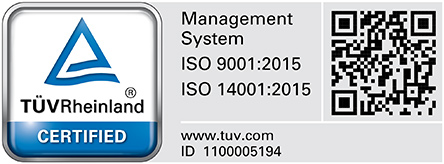Result of many years of consistent customer and process orientation at Fraunhofer IKTS- Sustainable quality assurance management in both institute branches and compliance with legal environmental requirements
Fraunhofer IKTS stands for applied research. Together with our partners, we turn original ideas into innovations - for the benefit of society and to strengthen the German and European economy. As drivers of innovation, we lead strategic initiatives to solve future challenges. From this we develop technological breakthroughs. The mission of the institute follows the idea of Fraunhofer research; our values and daily actions are shaped by the Fraunhofer culture and the fundamentals of the Fraunhofer-Gesellschaft, which are expressed in the statutes, the guiding principles / the mission of the Fraunhofer-Gesellschaft, as well as the principles for cooperation with business partners and other topic-specific guidelines.
»The task of the Fraunhofer Institute for Ceramic Technologies and Systems IKTS is to develop the latest ceramic materials and technologies and to transform them into marketable, internationally leading products and processes.«
For us, quality, reproducibility, transparency, and ecological sustainability are among the most important instruments for differentiating ourselves from the competition. Fraunhofer IKTS therefore has a quality management system according to DIN EN ISO 9001, and additionally, at its sites in Dresden Gruna and Hermsdorf/Thuringia, an environmental management system according to DIN EN ISO 14001. Furthermore, the institute operates accredited laboratories according to DIN EN ISO / IEC 17025 in some areas and a management system for medical devices according to EN ISO 13485.
The integrated and process-oriented management system of Fraunhofer IKTS aims at improving our business processes for the benefit of best-possible quality, occupational safety and environmental friendliness. Our objectives, as well as quality and environmental goals are:
- Continuous increase of customer satisfaction
- Building customer trust
- Excellent preliminary research to meet customer requirements in the long term
- Consolidation of our profitability
- Compliance with legal requirements
- Increased employee satisfaction
- Establishment of transparent and permeable career paths in science
- Promoting the sense of responsibility of our employees
- Transparency of operational processes
- Need-oriented public information policy
- Continuous improvement of internal organization and environmental performance through increasingly efficient working methods and technical development
- Cost savings through sustainable systematization in the environmental sector
- Regular monitoring and assessment of the impact of all activities on the local environment
- Taking measures to prevent, eliminate, or reduce environmental pollution
